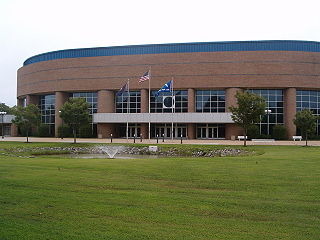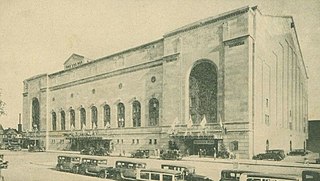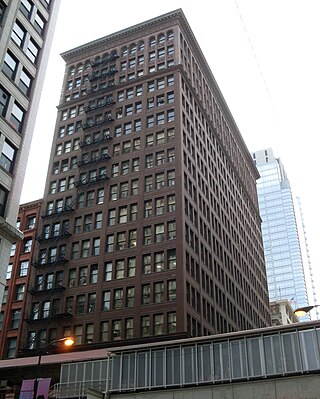Rational Machines is an enterprise founded by Paul Levy and Mike Devlin in 1981 to provide tools to expand the use of modern software engineering practices, particularly explicit modular architecture and iterative development. It changed its name in 1994 to Rational Software, and was sold for US$2.1 billion to IBM on February 21, 2003.
The Trinity Health Arena is a 3,000-seat multi-purpose arena in Muskegon, Michigan, United States. It was built in 1960 in partnership with philanthropist and industrialist Louis Carlisle Walker at a cost of $2 million, and on October 27, 1960, was formally gifted to the City of Muskegon. Mr. Walker provided $1 million and the City provided $1 million toward the cost. It is currently home to the Muskegon Lumberjacks of the United States Hockey League, Muskegon Risers SC of Major Arena Soccer League 2, and the West Michigan Ironmen indoor football team. The Arena will change its name to Trinity Health Arena after a corporate decision to rename Mercy Health facilities Trinity Health.

Mason & Hamlin is an American manufacturer of handcrafted grand and upright pianos, currently based in Haverhill, Massachusetts. Founded in 1854, it is one of two surviving American piano manufacturers from the "Golden Age" of pianos, although some smaller piano manufacturers have since started in the United States.

Ocean Bank Convocation Center is a 5,000-seat multi-purpose arena at Florida International University in University Park, Miami, Florida. It was opened on February 1, 1986, and is home to the FIU Panthers basketball and volleyball teams. It was originally named Sunblazer Arena, but was renamed Golden Panther Arena when FIU's athletic teams changed their nickname from Sunblazers to Golden Panthers in 1987. It was renamed Pharmed Arena in 2004, and then was briefly named FIU Arena in 2008 before being renamed to U.S. Century Bank Arena. The facility reverted to the FIU Arena name again from 2014 to 2018 before being renamed the Ocean Bank Convocation Center in 2018.

Koessler Athletic Center is a 2,196-seat multi-purpose arena in Buffalo, New York on the campus of Canisius College.

Hampton Convocation Center is a 7,200-seat multi-purpose arena in Hampton, Virginia. It was built in 1993 and is home to the Hampton University Pirates basketball team. The arena replaced Holland Hall gymnasium, which holds women's volleyball matches and tournaments. The construction cost was about $4 million-$5 million.

Sojka Pavilion is a 4,000-seat multi-purpose arena in Lewisburg, Pennsylvania. It was built in 2003 and is home to the Bucknell University Bison basketball teams, replacing nearby Davis Gym. It is named for Dr. Gary Allan Sojka, a former president of the university who remained at the university as a professor of biology after the end of his term, until his retirement in 2006. It features locker rooms, a hardwood playing surface, concession stands, LED video boards, a team store, and a Jumbotron.
Vermeer Technologies Incorporated was a software company founded in 1994 by Charles H. Ferguson and Randy Forgaard. Its products were a Web site development tool, FrontPage, and a Web server, Personal Web Server, which complemented developing in FrontPage. Vermeer launched the initial version of FrontPage on October 2, 1995.

Minneapolis Auditorium was an indoor arena in Minneapolis, Minnesota. It hosted the NBA's Minneapolis Lakers from 1947 until they moved to the Minneapolis Armory in 1959. The arena held 10,000 people and was built in 1927. The building fell into obscurity after the opening of the Met Center in suburban Bloomington. It was demolished in 1989 to make way for the Minneapolis Convention Center.

The Heyworth Building is a Chicago Landmark located at 29 East Madison Street, on the southwest corner of Madison Street and Wabash Avenue in Chicago, Illinois.

541 North Fairbanks Court, formerly the Time-Life Building, is a 404-foot-tall (123 m), 30-story skyscraper in Chicago, Illinois, designed by Harry Weese and completed in 1969. Located on the Near North Side, it was among the first in the U.S. to use double-deck elevators. The odd-numbered floors are accessible from the lower lobby, with even floors serviced from the upper level.

The Golden Nugget Pancake House is a chain of family restaurants originally launched in Florida but now operating exclusively in Chicago, Illinois. Some of the restaurants serve breakfast 24 hours a day, and their decor generally has a Western motif.
The Utah First Credit Union Amphitheatre is an outdoor amphitheater, located in West Valley City, Utah. From 2003 to 2024, the Amphitheater was named after USANA Health Sciences, a manufacturer of nutritional supplements. A new naming rights agreement with Utah First Credit Union was announced on January 23, 2024. It offers a view of the Wasatch Mountains. The venue opened July 2003.
Eureka is an American home appliances brand owned by Chinese company Midea Group that manufactures vacuum cleaners, including uprights, cordless, canisters, sticks and handhelds. Eureka also manufactures aftermarket vacuum accessories, such as bags, belts and filters.

Alexander Graham Bell School, also known as Bell School is a public school located in the North Center neighborhood of Chicago, Illinois, United States; it is a part of the Chicago Public Schools. It offers grades kindergarten through grade eight. It also has a deaf department for students in preschool through grade eight and additionally a Regional Gifted Center (Options) for students in grades kindergarten through eight.

Saluki Stadium is a stadium on the campus of Southern Illinois University in Carbondale, Illinois. It is primarily utilized by the Southern Illinois Salukis football team.

William Ryle II (1834–1881) was an English silk manufacturer who lived in the United States.

Markin Family Student Recreation Center is a multi-purpose student recreational facility constructed in 2008 at Bradley University in Peoria, Illinois.

Moody Coliseum is a 3,600-seat multi-purpose arena in Abilene. It is home to the Abilene Christian Wildcats men's and women's basketball, and volleyball teams. It is also used for concerts, chapel services, graduations and other special events, with a maximum capacity of 3,600.
William David Orthwein was a German-born American Civil War veteran and grain merchant in St. Louis, Missouri.